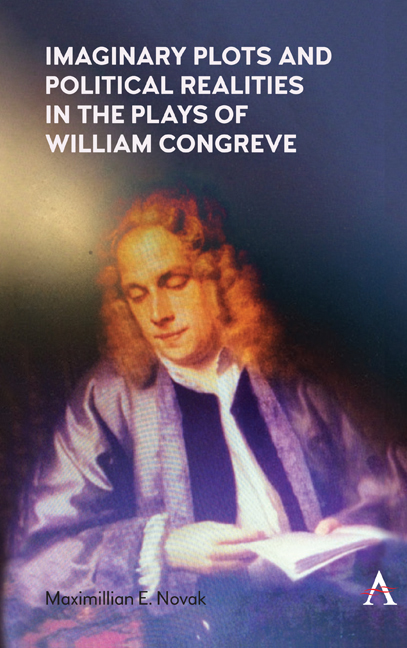Book contents
- Frontmatter
- Contents
- List of Illustrations
- Acknowledgments
- Preface
- 1 The Politics of Love, Marriage, and Scandal in Congreve's World
- 2 Incognita and Some Problems in Morality and Epistemology
- 3 The “Fashionable Cutt of the Town” and William Congreve's The Old Batchelor
- 4 Political and Moral Double Dealing in Congreve's The Double Dealer
- 5 Foresight in the Stars and Scandal in London: Reading the Hieroglyphics in Congreve's Love for Love
- 6 The Failure of Perception and Politics in Congreve's The Mourning Bride
- 7 Politics and Congreve's The Way of the World
- Afterword
- Works Cited
- Index
2 - Incognita and Some Problems in Morality and Epistemology
Published online by Cambridge University Press: 21 July 2020
- Frontmatter
- Contents
- List of Illustrations
- Acknowledgments
- Preface
- 1 The Politics of Love, Marriage, and Scandal in Congreve's World
- 2 Incognita and Some Problems in Morality and Epistemology
- 3 The “Fashionable Cutt of the Town” and William Congreve's The Old Batchelor
- 4 Political and Moral Double Dealing in Congreve's The Double Dealer
- 5 Foresight in the Stars and Scandal in London: Reading the Hieroglyphics in Congreve's Love for Love
- 6 The Failure of Perception and Politics in Congreve's The Mourning Bride
- 7 Politics and Congreve's The Way of the World
- Afterword
- Works Cited
- Index
Summary
The serious subject matter of a play such as Crowne's The Married Beau, discussed in the previous chapter, returns us to Vanbrugh's claim to being a “moralist” and the possibility of stage comedies being vehicles for moral statement. Although such a proposition might appear inane enough to any generation that lived to see the comedies of George Bernard Shaw and Bertholt Brecht, it did not seem at all evident to Jeremy Collier in 1698. As I remarked, my approach to Congreve's plays in this volume is through the ideas they convey, broadly philosophical, political, and social. I have no intention of denying that Congreve was eminently a man of the theater. His involvement with Thomas Betterton in listening to readings of the plays performed at the Lincoln Inn Fields theater shows how much he was involved with the intricacies or theatrical representation. Nevertheless, when dealing with a writer such as Congreve, it is necessary to discard the approach to Restoration drama of Robert Hume, who pointedly ignores an intellectual approach to drama as almost irrelevant. A time of political and intellectual strife, the last 40 years of the seventeenth century may well have been best summarized by Jonathan Swift's Tale of a Tub with its whirlwind of ideas on philosophical and religious beliefs— beliefs that led its readers into such complete confusion that insanity might seem a possible way out. Similarly, in matters of politics, many English men and English women, including such writers as John Dryden, Aphra Behn, and Thomas Southerne, remained loyal to the deposed king, James II, and a system of monarchy that gave him complete control over the lives of his subjects. On the other hand, Congreve was seriously committed to the politics surrounding the Glorious Revolution of 1688, the regimes of William and Mary and then of William III. And as his writings reveal, he appears to have been equally committed to the philosophical empiricism of the time, from René Descartes to George Berkeley— a view that acknowledged that we know the world only through our perception of it through our senses.
- Type
- Chapter
- Information
- Publisher: Anthem PressPrint publication year: 2020



